Are you ready to start the freight broker business in Texas but unclear about how to get your freight broker authority? You’re not alone. Many aspiring brokers feel overwhelmed by the licensing process, often wondering where to begin.
Just like navigating a complex highway, securing your freight broker license can seem daunting. However, with the right guidance, you can successfully chart your course toward becoming a licensed freight broker.
In this guide, we’ll lead you through the four essential steps to get your freight broker license, helping you transform your goal of beginning a freight broker firm into a reality.
The good news is that the licensing process, while detailed, follows a clear set of legal requirements. Once you understand the necessary steps, you’ll find that the path to becoming a licensed freight broker is more straightforward than it initially seems. Let’s break it down.
Who is this guide for?
This guide is designed for anyone looking to start a career as a freight broker, whether you have previous experience in logistics or are completely new to the industry.
What You’ll Learn:
- How to legally establish yourself as a freight broker
- The key legal and regulatory steps to avoid fines and penalties
- How to protect your business with a surety bond
Why You Can Trust Us
Over the years, we’ve worked with many freight brokers in Texas, helping them with compliance, factoring, and obtaining the necessary permits. We know the ins and outs of the process and have seen firsthand how following the right steps leads to success.
Something to keep in mind before starting
Before applying for your freight broker license, you need to establish your business structure. The options are sole proprietorship, partnership, forming a corporation (Corp) or forming a limited liability company (LLC). Each type has unique tax and legal implications, so it’s a good idea to consult with a business attorney or tax professional. In Texas, forming an LLC is a popular choice due to its flexibility and liability protection.
Step 1: Apply for Your Broker Authority from FMCSA
The first legal step for becoming a freight broker is applying for a freight broker authority from the Federal Motor Carrier Safety Administration (FMCSA). This allows you to legally operate as a broker and connect shippers with carriers.
To start, you’ll need to fill out the application for Motor Property Carrier and Broker Authority. This form collects key information about your business, including its structure, the type of authority you’re requesting, and your operational details. If you’re not sure of how to fill out the form, consider seeking professional assistance from a trucking permit company to ensure everything is completed correctly and avoid costly mistakes. Texas Truck Permits has helped 100’s of freight brokers start their business in Texas over the years. We have the expertise to fill out the form correctly and get you running
Key Tip: Make sure all the details on your OP-1 form are accurate, as any errors could delay your approval. Once the form is submitted, you’ll receive a Motor Carrier (MC) number, which is essential for your business operations.
The MC number is also required to take the next legal steps, like securing your surety bond, and is often requested by potential clients as proof that your company is fully authorized to conduct business. In addition, your Operating Authority status will be listed in the FMCSA database, making it easy for clients and carriers to verify your credentials.
Step 2: Obtain a $75,000 Surety Bond
To protect the clients you work with (both shippers and carriers), the FMCSA requires all freight brokers to have a $75,000 surety bond. This guarantees that you will follow federal regulations and pay any claims if disputes arise. You don’t need to pay the full $75,000; instead, you’ll pay an annual premium, typically ranging from 1-5% of the total bond amount.
The surety bond not only protects your business relationships but also builds credibility in the highly regulated trucking industry. Shippers and carriers prefer working with bonded freight brokers because it assures them that their financial interests are secure. The bond also serves as a safeguard for the federal government to ensure compliance with FMCSA regulations.
Pro Tip: Look for a reliable surety bond provider with experience in the Texas trucking industry. By shopping around, you can find the best rates for your bond.
Step 3: Designate a Process Agent and File Form BOC-3
Once you’ve secured your bond, the next critical step is to designate a process agent for every state where you plan to conduct business. A process agent acts as your legal representative, receiving and handling any legal documents, such as lawsuits or claims, on your behalf. Filing Form BOC-3 with the FMCSA is necessary to officially appoint your process agents. This form must be submitted before your freight broker authority is active, so it’s a crucial step in getting your license finalized.
If you plan to operate across multiple states, using a national process agent service can simplify the paperwork and ensure that all states are covered under one service provider. This makes it easier to manage your compliance requirements across state lines, which is especially useful if you’re operating in a high-traffic state like Texas, where freight volume is consistently high.
Common Mistake: One of the most overlooked steps by new freight brokers is failing to designate their process agent. Skipping this requirement can result in significant legal complications, as missing important legal documents could lead to penalties or even the revocation of your operating authority. Make sure this step is completed promptly to avoid any costly issues down the road. Additionally, keep your process agent information updated if you expand your operations into new states.
Step 4: Register with the Unified Carrier Registration System (UCR)
Finally, to complete your freight broker licensing process, you’ll need to register with the Unified Carrier Registration System (UCR). The UCR is an annual fee which is based on fleet size to supplement funding for state highway motor carrier registration and safety programs. By registering with the UCR, your freight brokerage remains compliant with federal regulations, and it allows the FMCSA to track your business’s licensing, insurance, and operating authority in one system.
In Texas, where the trucking and logistics industry is vital, staying on top of FMCSA compliance through the UCR is especially important. Failing to stay updated in the UCR can lead to penalties and fines.
Pro Tip: Once registered, make sure to regularly update your information, especially if there are any changes to your business structure, address, or operations. In the fast-paced Texas freight industry, keeping an eye on Texas-specific regulations is key to avoiding compliance issues. Ensuring your UCR filing is current can also improve your credibility with carriers and shippers who rely on your operational legitimacy.
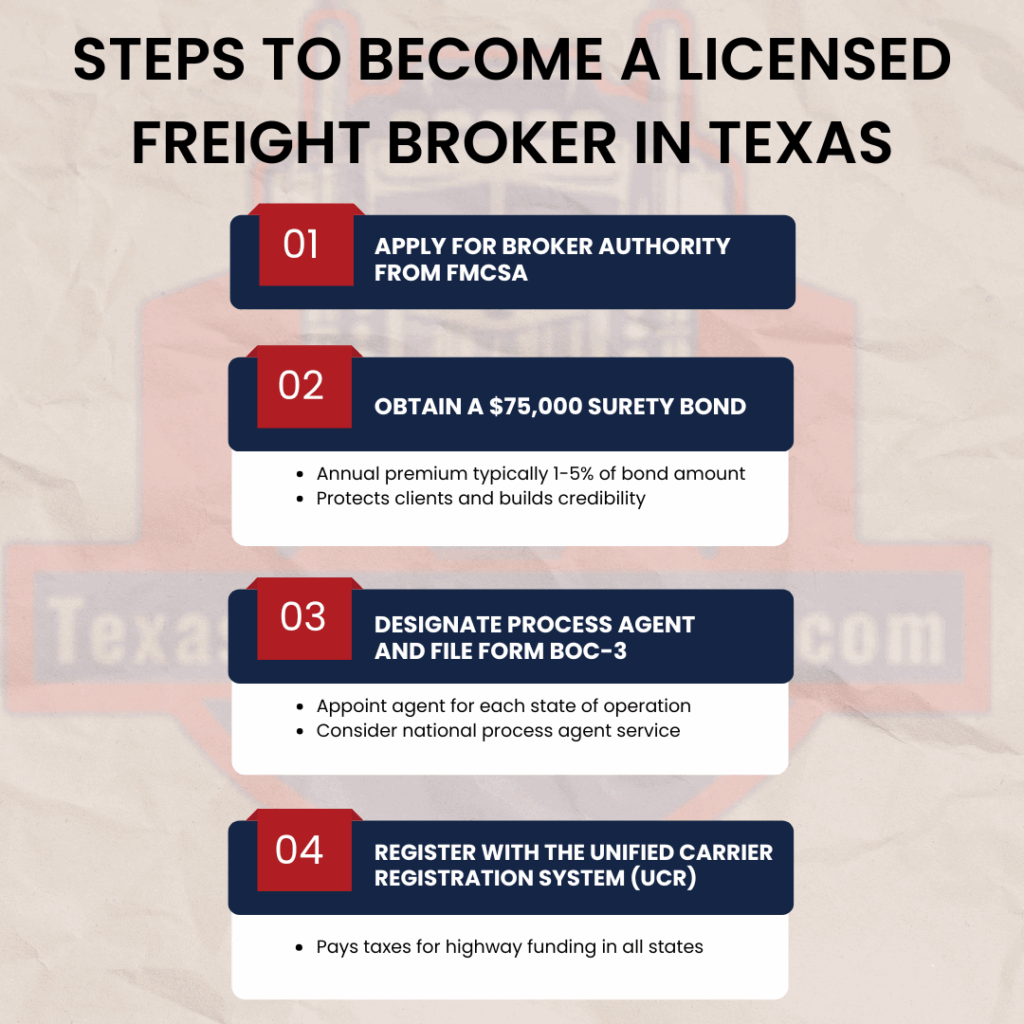
Other bonus tips
Invest in Freight Broker Training
Although not required by law, freight broker training is highly recommended. A solid training program helps you understand industry-specific regulations, develop the necessary skills, and learn how to manage carriers and shippers. Look for reputable online courses or hands-on training from established brokerages. Many courses are also tax-deductible, making this a smart investment for your new business. One place you can learn is through the University of Houston
Final Thoughts
Getting your freight broker license in Texas may seem overwhelming, but by following these essential steps, you’ll be able to operate your business legally and confidently. From applying for your broker authority to securing a surety bond, these steps are designed to help you stay compliant with FMCSA regulations and protect your business from any legal issues.
Next Steps
Now that you know how to get your freight broker license, it’s time to take action. Ready to dive deeper into getting your trucking permits, compliance and factoring for your trucking business? Contact us to get started and stay compliant with the latest regulations.
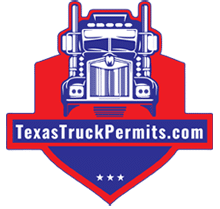
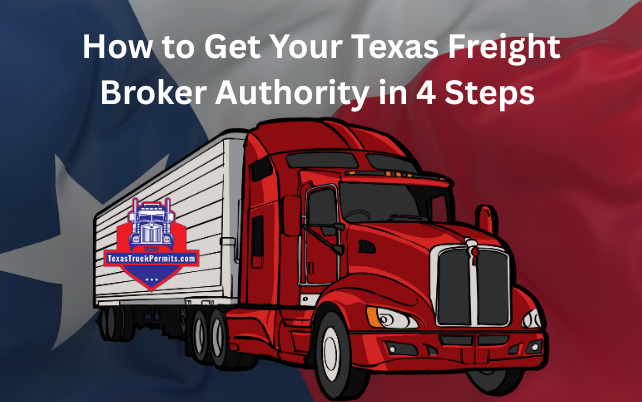
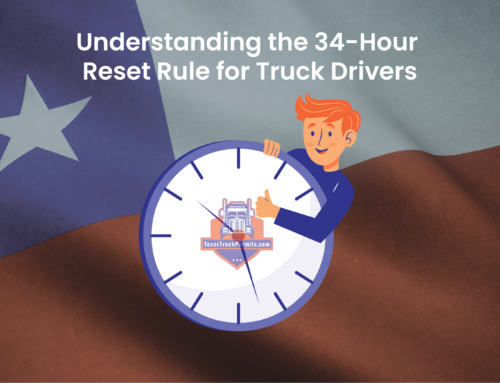
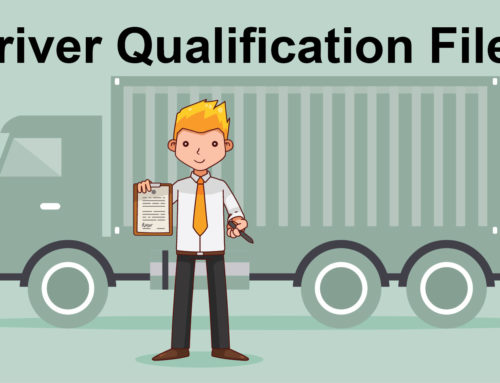
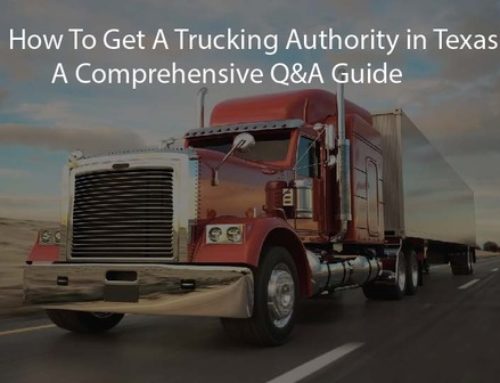

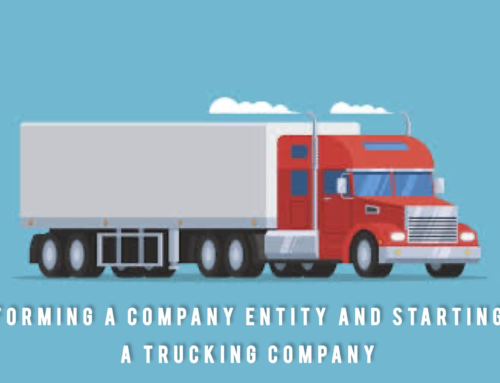
Leave A Comment